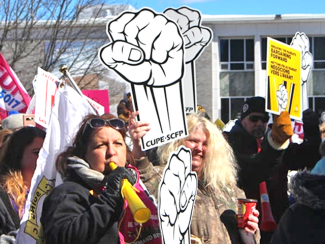JUST WAIT
Court rules union has to wait to act on 90% strike vote

NURSING HOME WORKERS IN NEW BRUNSWICK are underpaid, overworked, and undervalued. They’ve been working without a contract for over two-and-a-half years. And the government has imposed a 1 percent annual pay increase on them, which is a pay cut when you count inflation.
Rather than bargain fairly with them about these scandalous conditions, the Progressive Conservative provincial government and the New Brunswick Association of Nursing Homes have spent the past few months securing court injunctions to block the 4,000 workers from exercising their democratic right to strike. They succeeded in getting the Court of Appeals to suspend any action until early July, when a ruling is due on an application by the New Brunswick Council of Nursing Home Unions to overturn the injunction.
Workers voted by over 90 percent to authorize strike action in March. They hoped the vote would bring the employers and government to the negotiating table so that they could reach a new contract agreement containing real improvements for licensed practical nurses, residential attendants, and support service workers. Instead, the government continued to ignore the nursing home workers. So on May 1, international workers’ day, Canadian Union of Public Employees members occupied the office of Social Development Minister Dorothy Shepard in Fredericton to demand a meeting.
Low wages and hard work
Providing care for the elderly is a critical social service. But the government and nursing home employers aren’t prepared to pay workers accordingly. Sharon Teare, the president of the New Brunswick Council of Nursing Home Unions, pointed out that when she started in the industry over 20 years ago, she was on a wage of $14 an hour. Two decades later, her pay has only gone up by about $7 an hour.
“We’re not just working, we’re working with humans,” Teare explained. “They’re deserving of time and unrushed time.”
In early May, groups of workers at all 46 nursing homes across the province held protests outside their facilities. They chanted slogans and wave placards, receiving support from motorists who passed by.
“Asking for a cost of living raise isn’t unreasonable,” said Rita Beaumont, a residential attendant. Cindy Gillette, another protesting worker, added, “The government is forgetting about us.”
“They haven’t taken us seriously for a very long time,” agreed Tammy Nadeau, a nursing home worker in St John. “All we want to do is go to binding arbitration with no parameters. And have an arbitrator tell us what we’re worth.”
How short are we today?
On top of the poor pay, workers say they are hopelessly overworked due to a lack of staff. Both issues are interlinked, because the low wages don’t offer any encouragement for young people to make nursing home work their career.
One worker attending a rally in Fredericton in March shortly after the initial strike vote summed up the crisis conditions prevailing, commenting that the first question they hear every morning when arriving at work is, “How short are we today?”
Another worker explained how he had been encouraged to attend the protest by his parent, who is a nursing home resident. This is just one example of the broad public support the nursing home workers enjoy in their struggle, even from those who would be impacted if the workers are forced by the government’s intransigence to take strike action.
Privatization is the real problem
The nursing home workers’ years-long struggle for decent wages and fair working conditions has shown that many things need to change. The union is demanding a 20 percent pay increase over four years, which is more than justified. Workers are also pointing to the need to do more to attract new personnel into the industry and retain current employees as nursing homes are chronically understaffed.
But much more is required to improve the elderly care sector if we are going to have a dignified system for our seniors. Above all, the drive to outsource and privatize social services to so-called “non-profits” has facilitated downward pressure on workers’ wages, a reduction in labour standards, and a worsening of the quality of care. Large investors and highly-profitable companies have exploited the friendly-sounding “non-profit” label to establish organizations to obtain government contracts. But behind the terminological difference is the same process of privatization that has failed us time and again.
The story has been the same throughout the social and healthcare services in Atlantic Canada, as was recently seen by the protests in Nova Scotia by paramedics over the disastrous state of the province’s emergency response system. Nova Scotia outsourced its ambulance service to a “non-profit” controlled by medical services giant Medavie Health Services, which describes itself as “the largest private provider of emergency medical services in Canada.”
The elderly care sector and other critical social services should be well-funded, public services. That’s the only way that the shortage of staff and poor pay can be fundamentally dealt with.
- 30 -












Add new comment